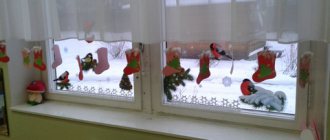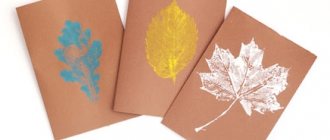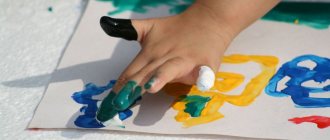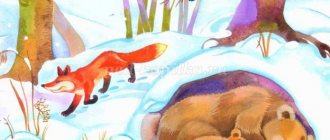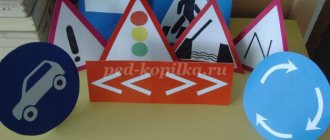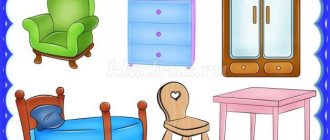MAGAZINE Preschooler.RF
Summary of a lesson in the junior group on social and communicative development Topic: “Journey to the Fairytale Forest.”Goal: developing children’s ideas about emotions and friendly relationships.
Objectives: to form children’s ideas about certain emotional states and feelings of people: joy, fun, sadness, anger, fear. Learn to express them using facial expressions, gestures, and pantomimes. Learn to describe your mood, introduce words into your active vocabulary: joy, joyful, sadness, sad, angry, angry; teach the use of polite figures of speech. Develop an understanding of your mood and the mood of others, the emotional sphere of the child. To cultivate a kind, attentive attitude towards others, each other, the need for friendly communication.
Material and equipment: Screen; bi-ba-bo dolls: “Wolf” , “Little Red Riding Hood” ; paper airplane with letter; cloud of Good; gift box; forest scenery; audio recording “Sounds of the Forest” ; songs: “Little Red Riding Hood” by Y. Mikhailov, “True Friend” by B. Savelyev; basket; dummies of fruits and vegetables; multimedia presentation “In the world of children's emotions” .
Preliminary work.
- Game situation “The dolls quarreled”
- Reading a poem by S.Ya. Marshak "Kittens"
- Looking at paintings, talking about mood
- I/u “I am happy because...” , “I am sad because...” .
- Introduction to the fairy tale "Little Red Riding Hood"
- Examination of book illustrations for the fairy tale “Little Red Riding Hood”
- Listening to the song about Little Red Riding Hood
Methodological techniques.
- Surprise moment - plane with letter
- Presentations “In the world of children's emotions”
- Problem situation “How to cheer up Little Red Riding Hood”
- Game motivation “Let's help Little Red Riding Hood”
- D/i “Assemble a basket”
- Game-trip to the “Fairytale Forest”
- Game exercise . ”
- Physical education
- Didactic game . "
- Bottom line
Progress of the lesson.
Educator: Have fun, kids, it's time to play! Guys, Little Red Riding Hood wanted to play with you today. But where is she, have you seen her? She's probably hidden, let's look for her (the children are looking, the junior teacher, unnoticed by the children, launches a paper airplane with a letter).
Educator: Guys, look, the plane is flying, and there is a letter! "Urgently! From Little Red Riding Hood. The children of the “Thumbelina” group wonder what Little Red Riding Hood is writing to us?
“Hello, kids, girls and boys! I won’t come to you today. Please excuse me.
Grandma is sick, I’m in a hurry to visit her!
Educator: Guys, what do you think Little Red Riding Hood’s mood is now? Why? (children's answers) Guys, I suggest you watch a film about what our face looks like when our mood changes.
View the presentation “In the world of emotions”
Educator: Do you ever feel sad? Why? (children's statement) Guys, do you think we can cheer up Little Red Riding Hood?
Problem situation “How to cheer up Little Red Riding Hood” (children’s statement)
Educator: And I wanted to invite you to visit Little Red Riding Hood and her grandmother. She told me that her grandmother loves fruit. Let's fill her a whole basket and go to the Fairytale Forest! Yes Yes! It is in the Fairytale Forest where her grandmother lives.
D/i “Assemble a basket”
Well done guys, you completed the task and picked up a lot of fruit!
“Good” will show us the way to the Fairytale Forest .
cloud of “Good” , appear, show yourself to us.”
Here it is, the cloud of “Good” ! Guys, why do you think it was called the cloud of “Goodness” Children: it looks kind, cheerful, good.
Educator: that’s right, hold on tight to him - and off you go!
Close your eyes: “One, two, three - get into a fairy tale!” (the screen opens, birdsong is heard, a wolf appears behind the screen)
Wolf:
I am an angry and terrible Gray Wolf. I know a lot about kids. I haven’t eaten at all since this morning, I’ll eat you guys!
Well, are you scared?
Children: Yes!
Educator: and I became scared, what kind of wolf do you think?
Children: angry
Educator: I also think he’s evil. Guys, can we show you what kind of face a wolf has?
Children: Yes! (children's facial expressions)
Educator: and now, I suggest you look at pictures of what our face looks like when we are afraid or angry. ( "Fear and Anger" )
Educator: Guys, what do you think needs to be done? To make our face look kind?
Children: you need to smile, be kind.
Educator: That's right, guys. I invite him to just smile his kindest smile. Look, from our kind smile the wolf also became kind.
Educator:
Smiling made everyone feel warmer, and the wolf became happier! Would you like to play with us and guess the magic words?
Wolf: I'll be happy to play!
Game exercise “Say a word”
- Having met the Bunny, the Hedgehog-neighbor says to him (hello)
- And his big-eared neighbor answers “Hedgehog” (hello)
- If we can’t eat anymore, we’ll tell mom (thank you)
- When we leave, we say goodbye to everyone (goodbye).
- Lena complains to her mother and doesn’t give Vanya the toy.
Lena, don't complain, just say (please)
6. The clumsy dog Kostik stepped on the mouse’s tail.
They would have argued, but he said (sorry)
Wolf: Why do you think I was angry? (children's answers). Because I had no friends, everyone just scolded me and set dogs on me. That's why I got angry at everyone. And now, thanks to your smile and warmth, I have become kind. It turns out that being kind is much better!
Educator: You see, guys, any fear or anger can be overcome with your kindness and friendship.
I advise everyone to be friends, Don’t you dare fight, We can’t live without friends For anything in the world.
Wolf: You made me kinder. Life immediately became more fun. For this I will help you, I will show you the way to the goal.
Are you looking for the way to Little Red Riding Hood? I'll help you find her. Go towards the flower meadow
Educator: Goodbye and thank you, Gray Wolf (the children go to the clearing for the teacher). So we came to a green clearing. Guys, we've come such a long way, I suggest we take a little rest?
Physical education
An apple tree in my forest - Bends low in the wind. She leaned to the right, to the left (tilts to the right, to the left) She wanted to sway.
She swung the branches up and down (slowly swinging her arms up and down from the sides) and stretched them forward (bending forward) And when the breeze subsides, my apple tree will fall asleep.
We have a game like this, (spread “open” hands to the sides) Very easy, simple: (smoothly return them to the belt) The movement slows down, (slowly swing your arms up from the sides) Tension disappears...
And it becomes clear: (they smoothly lower their hands, bending down) Relaxation is pleasant! (and relax them, relieving tension from the shoulder girdle to the hands, shaking them slightly) So the game is over, it’s time for us to wake up! (straighten up, stand up)
Educator: So we rested, became cheerful and cheerful. Look, even the sun smiles at us, let’s smile at him too. (Little Red Riding Hood's song is heard)
Little Red Riding Hood: Hello, guys! It's so good that I met you. I hope you received my letter, but where are you going?
Children: Hello, Little Red Riding Hood! We received the letter, we are going to visit your grandmother, and where are you rushing?
Little Red Riding Hood: While grandma is resting, I decided to go buy some fruit, she loves it very much.
Educator: There is no need to rush anywhere, we have picked up a whole basket of fruit for your grandmother, take Little Red Riding Hood (the children hold out a basket of fruit)
Little Red Riding Hood: Thank you very much, friends. For your kind and caring attitude towards me and my grandmother. For your kindness, I want to give you a magic box (gives a box)
Educator: Thank you, Little Red Riding Hood. If your grandmother is resting, we will not bother her, give her our best regards and let her get better. Goodbye Little Red Riding Hood!
Little Red Riding Hood: Goodbye, children!
Educator: We will look at what we have in the box in the group. Now hold on tight to the cloud of “Good” , it’s time for us to return to the group! “One, two, three – get into the group!”
We returned to our group, would you like to see what Little Red Riding Hood gave us?
Children: Yes! These are puzzles!
Educator: Guys, I suggest you sit down at the tables and collect puzzles.
Didactic game “Assemble puzzles”
Educator: Guys, what did you do?
Children: Sunny!
Educator: That's right, guys, honey! What do you think his mood is? (children's answers) I agree with you, joyful, cheerful, like that (picture “Joy” ).
Educator: Our journey has ended. Did you guys enjoy traveling? (Yes) Who did you meet on the way to Little Red Riding Hood? What was his mood and what did his face look like? What good deed have you and I done? and so on.
Guys, please mark your mood with a pictogram (children choose).
Educator: Guys, pick up the pictures, I’ll see what mood you’re in, you chose everything with a smile, so what’s your mood?
Children: good mood.
Educator: Guys, I’m in a good mood, I also enjoyed traveling with you. And keep the pictures for yourself; when you are sad, you look at it and your mood will immediately lift.
List of sources used.
- N.M. Metenov "Lessons of politeness: a practical guide" . - Yaroslavl. – 2000. – 50s.
- Group tradition in kindergarten: planning, educational activities, festive evenings for children 4-7 years old. Author - comp. S.V. Shaposhnikova. – Volgograd: Teacher, 2009. – 158 p.
- Sokolova O.A. World of communication. Etiquette for children of preschool and primary school age. – St. Petersburg: KARO, 2003. – 288 p.
- Play as a means of social-emotional development of children 3-5 years old. / Comp. R.A. Zhukova. – Volgograd: ITD “Corypheus” , 2006. – 112 p.
- Sevastyanova T. Getting rid of aggression with the help of games. / Preschool education. – M.2008. - No. 12. – p.77 – 80.
- Belokurova G. Etiquette in the process of preschoolers mastering a social role. / Preschool education. – M. 2007. – No. 11. – p. 40 – 47.
| Next > |
